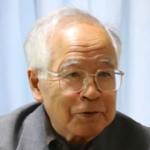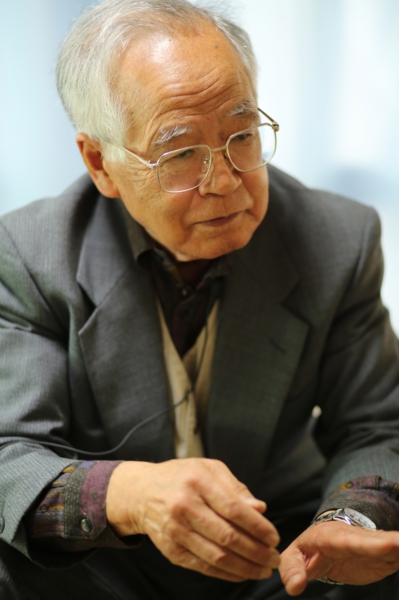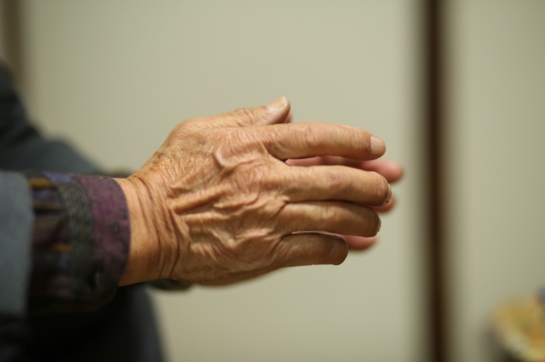- English
- Español
- Italiano
- 日本語
‘Memories of War’ is a project which leaves voices of the people who survived the war. We are not supporting any specific organization, and we are not agitating any thoughts.
Moreover, please be consent about the following descriptions.
- The contents of the interview have left the voices and thoughts of the people who survived from the war.Moreover, there might be inappropriate expressions but we have left the voices as it was spoken.
- The articles were recorded based on the knowledge and memories during the interview were taken.Therefore, there might be memories difference and some ambiguous point.
Memory 8 Hiroshi Kamei
“The faith of Article 9 of the Constitution”, which is the message I want to leave for posterity.
 |
Hiroshi Kamei born in 1932, Yonago City, Tottori Lives in Ebina City, Kanagawa Manager of an antiquarian bookshop “Ebina Heiwa Shobou” |
|---|
The war was by his side from a young age to the first grade of junior high school. In regards to education, the process related with the understanding of history and thought produced big differences before and after the war.
He felt both pride and sadness to his immediate family or friends who got drafted. How was his life in the city away from the ravage of the war with the view of an honest child’s mind?
“Toho Yohai”, which was a strange custom of that time for a child’s mind
──Could you tell us what reminds you of “Memories of War”?
I was born in Showa 7 (1932), which was the year following “Manchurian Incident”. From my childhood to boyhood, the “15-Year-War”, so it was called, was on.
My childhood was in the generation of the war. (“15-Year-War” is a generic name of “Manchurian Incident”, “The Pacific War” and the defeat in war)
In Showa 20 (1945), which was the end year of the war, I was in the first grade of junior high school. I entered the school and got military training from April to August to become a soldier in the future. The third year students worked in a factory but the younger students practiced how to march as a soldier, to dig holes called “Takotsubo” with a small scoop that the military used. (“Takotsubo” is like a hole and a small bomb shelter only for one person in case of air raids)
I thought I was part of a precious generation because I spent my life both before and after the war. I was a second term student in the new high school system which was coeducational.
──Looking back to before and after the war, what was the most different thing? I have one image that everything completely changed though…
The typical change was Japanese history I think.
Before the war, we learned mythology as a real history and was called “Kokushi”: Sun Goddess; Amaterasu Oomikami, peerless Japan, a divine land, Emperor worship, Japan is the greatest divine country in the world. We learned those things thoroughly so I thought Japan was the most excellent country.
However, I wondered the way of greeting held in the morning meeting. That was called “Toho Yohai”. There was the Imperial Palace to the east direction. All students faced to the direction and made a profound bow together. (“Toho” is east direction. “Yohai” means to bend the knee to Shinto and Buddhist deities from a distance.)
When I did that every morning around 8:00 a.m. I was a child at that time, so I was wondering purely, “What is His Imperial Majesty doing? 8:00 a.m. is morning time, so he may be in the restroom or not.”
Worshipful brother’s dispatch of troops
──Where were you in 1945?
I was in Yonago City, Tottori Prefecture when I was 18 years old.
Yonago City is a commercial town and is the second biggest city in Tottori. My family ran a hardware store, but metal was used as weapons.
That is why there were few metal goods in our store. We sold wooden types of things, like buckets, wash-basins, and so on.
──In your family, did someone go to the battlefield?
Out of 7 brothers and sisters, I was the youngest of them. Three of my older brothers went there.
The oldest brother worked for Japan National Railways. However, he was conscripted and was dispatched to the battle zone in China.
My second-eldest brother went on to university. It was a rare case at that time. During that time, the plan of Manchuria emigrant inspired him to be a leader of a group, “Shonen Giyuu Gun”. He stayed in Manchuria till the end of the war.
(“Shonen Giyuu Gun” consisted of 15-year-old to 19-year-old people. Japanese government resolved the promotion plan in 1936 that a total of 5 million Japanese people and 1 million families emigrate to Manchuria. After they got both agriculture and military trainings, they were sent to the settlement by units of 300 people.)
My third-eldest brother served as “Konoehei” in Tokyo.
(“Konoehei” is the soldier who is responsible for guarding the Emperor of Japan. It is the immediate soldier of the Emperor.)
When Great Tokyo Air Raids broke out, I heard that he engaged in fire fighting in the Imperial Palace.
At that time, to become the member of Konoehei was a worshipful thing.
Only the people who passed the investigation around themselves and were smart were allowed to become the member. Moreover, their family was needed to be sound. That is why people around them thought highly of becoming Konoehei member.
My parents may have thought worry and fear when he headed to the battle fields, but I was an elementary school student, so I thought highly of him to become one of the members of Konoehei.
I don’t know exactly how he felt at that time, but I didn’t feel a fear from him and he didn’t seem not to want to go to the battlefield.
I thought that it was an honored thing for people to serve for Japan and The Imperial Majesty sincerely.
──During the war, the media broadcasted, “Japan keeps winning”. However, I noticed through these interviews there were many opinions like this; “I noticed Japan was defeated.” “Japan definitely wins this war.” How did you take the media reports?
I was a child at that time, so I thought Japan was enduing a hard situation. However, I never imagined a defeated Japan.
My house was in the center of the Yonago area and was near a post office. At that time, the owners of the houses around public institutions had to leave there and demolish their houses because of “Kyosei Sokai Rule”. (“Kyosei Sokai” is an enforced evacuation)
The people around the areas carried their baggage to like a warehouse for preparation to move to the new house. However, we got the information of evacuation postponement a few days before the end of the war. That is why we were able to avoid demolishing our house at the last second. In retrospect, the postponement may have foretold us the defeat of Japan. At the same time, I thought “Gyokuon Hoso” was one of the strategies to buy time before Japan was defeated. (“Gyokuon Hoso is the broadcast of the voice of Japan’s Emperor Hirohito) I never ever thought Japan’s defeat in war because I believed in Japan’s everlasting power.
During the war, we were under the “Touka Tosei”. (“Touka Tosei” is a light control. We had to darken the room everyday in case of the light leaking.) However, after the broadcast, I got the information from our neighborhood association that the control rule ended. This end of the rule made me very happy as I could turn on the light as I wished without worry as a result of world peace. We didn’t need to darken our room under the rule anymore.
To be honest, I was a child, so was still confused. I thought whether Japan pretended to surrender as one of the strategies or the war defeat was real so we didn’t need to pay attention to the light anymore.
After General MacArthur began to occupy Japan and the occupation troops came to Tokyo, I gradually thought Japan’s war defeat was a real thing. I spent my time in complicated thought for a month after the war.
During the war, I took a junior high school entrance examination. The teachers asked me, “What is your dream?” I answered,” I’ll do everything possible in my power for Japan. My dream is to become a scientist who can make weapons.” Children around that time seemed to have the feeling, “for the good of the nation”.
Hiroshima’s situation from a view point of the nearby city, Yonago
──Could you tell us how you felt about the atomic bomb of Hiroshima on August 6th far from the city, Yonago?
After my oldest brother retired from the military force because of his sickness, he started to work as a railway education instructor at Japan National Railway in Hiroshima. Right after he got off the train at Hiroshima Station, he suffered from the atomic bomb. He said it was terrific heat and took much time to settle the situation. I heard that new type of bomb was dropped on Hiroshima, and it did terrific damage to Hiroshima. However, the situation didn’t seem to reach Yonago City fully. I had never imagined how awful the damage Hiroshima City sustained. I thought the military forces may have controlled the information of the real damage.
At that time, there were about 50,000 people living in Yonago City and it was a small city. When I was in a bomb shelter at night because of an air-raid siren, I heard the sound of B29s flight from 80,000 to 10,000 kilometers high. They seemed to fly to the Korean Peninsula to drop mines. I also knew that combat aircraft dropped ammunition about by a strafing run several times. However, they didn’t drop the bomb directly on the Yonago area. I heard about Great Tokyo Air Raids and the other cities’ air raids situation from people who got damage from an air raid in Osaka and entered junior high school in Yonago City from Osaka. I didn’t feel fear here and never thought Japan’s defeat.
Wistful memory, dispatch of teacher who I think highly of
──In retrospect, could you tell us about your hardest thing during the war?
Or rather I should say, it is about my teacher’s dispatch when I was in the
fourth grade of elementary school. He graduated from teacher’s school in Tottori Prefecture at the top of the class and had a second degree in Judo.
I took his lesson half year but he entered the “Tottori Regiment”. I went to see him with my mother there but I heard he was going to be sent to Manchuria.
The ship bounding for Manchuria set off from Shimonoseki City. I also heard that he got on the train of the Sanin Line and headed to Shimonoseki, so we kept waiting for the train he got on by the side of railroad from 7:00 p.m. to 8:00 p.m. This was the time the train was scheduled to pass by.
The train came by and I thought he may have leaned out the window. However, all of the blinds of the window were pulled down completely. I thought the military may not have wanted to let people know there were people who were sent to the battlefield on the train.
I expected I was able to look at his face, but I saw only the light inside of the train through the window. The train had passed by. He was an excellent teacher so he remains in my mind.
After that, I heard he was sent from Manchuria to the Philippines and was killed there. He was a “Kirikomi Taichou”. (“Kirikomi Taichou” is a leader of the troops. The leader is the first person to attack an enemy’s position.) He may have been around 22 years old.

War and shape of education
──Your antiquarian book shop name is “Heiwa Shobou”, and there are many keywords related in “war”, “peace”. (“Heiwa” means peace) Even though people lived during the war, some of them may not have experienced it directly. Could you tell us the reason you focus on these words, “war” and “peace” as your shop’s theme?
The population of the people who have experienced the war has gradually decreased and the current Japanese Cabinet members, and Prime Minister Abe haven’t experienced the war first hand, right?
I feel fear to this situation. I didn’t experience anything as a soldier nor as an atomic bomb survivor, but I feel I have a strong mission to tell people about this war. Hiroshima and Nagasaki’s damage remains clearly I think.
I worked for a private high school as a social studies teacher at Housei University Girl’s High School for around 35 years. I made an optional course named “Showa History”. (“Showa” is a Japanese traditional era name)
At that time, our school didn’t have a school trip system, so I took the students of that course to Hiroshima as a research trip. I had them submit the report of Hiroshima. I selected better reports from some of them and published the book with the title of “High School Students Who Learn Showa History”. That was about 20 years ago.
──68 years have passed since the war ended. The number of people who didn’t experience the war increases. Do you feel the memories of the war seems to fade from people?
Yes, I feel it. The war is not a subject of my conversation with my grandchildren who are in the first year and third year of high school.
My son is a photographer and has been to Vietnam. He seems to tell them about wars. Compared to other children, they may know more than others about wars but they don’t talk about wars all the time. I think I need to tell them but have little time to do that.
My brother who was exposed to the atomic bomb rarely told us about his experience but his report about the atomic bomb was on a magazine with the title of “Sekai”. Just after he was exposed to the atomic bomb, he seemed to be in charge of finding his co-workers in Hiroshima but he seldom told me about it.
My thought to Article 9 of the Constitution
──I heard from people that after they told their awful war experiences to others, some of them become in bad condition. The population who experienced the war is decreasing gradually. It may be an unavoidable fact the memory of the war of Japanese people gradually fade from them. Could you tell us how you feel about the current Japan as a person who experienced the war?
I feel fear to the word “Kokubou”. (“Kokubou” means national defense)
In my opinion, people tend to think to protect the nation is a very important thing. However, before the war, Japan invaded other countries under the word “Kokubou”, and that is our history. Whenever I hear this word “Kokubou” or “The Act on the Protection of Specially Designated Secrets”, I think they have dangerous tendencies. Innocence is the most dangerous thing I think. Before the war, Japanese people weren’t indifferent, but they seldom discussed political things in their daily lives. Especially, at that time, there was a situation, “Woman shouldn’t meddle in the politics. Just follow what the government says.” If the act passes the legislation, people may lose their opportunities to tell their opinions they want to say.
There are two things I was surprised at after defeat. The first one was about the surprise of Japan, a divine land’s war defeat. The second one was, though the numbers were few, that there were people who were against the war.

──Could you tell us your message, as a person who experienced the war?
That is Article 9 of the Constitution. There are many conflicts in the world but I think strongly that we keep to uphold Article 9 of the Constitution as our important, basic way of thinking in our minds. We shouldn’t solve those conflicts by a military power but through discussion.
(Interviewer:Yohei Hayakawa, Writer:Emi Endo, Translator: Yoshino Wakamatsu)
